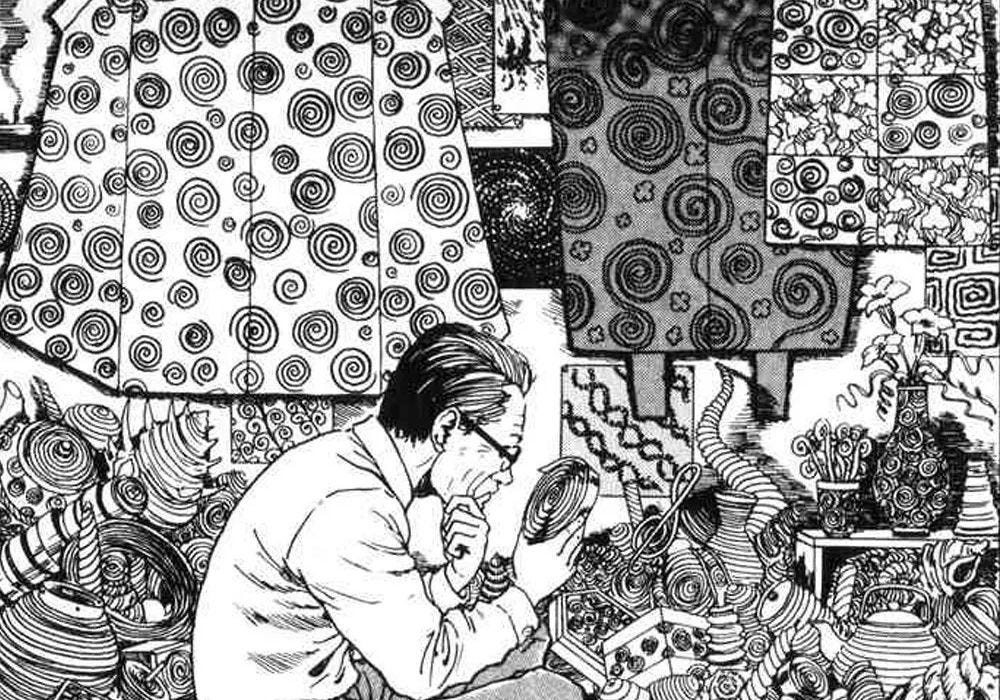I was having a smoke break with my students the other day. A group of them had been steadily running off somewhere during recess, and I’ve never figured out exactly where they went, so now I’d prepared my pipe for its weekly stage appearance and thought I’d tag along.
Turned out they’ve been going to this huge hotel just across the street where there’s a back room for smoking tucked away in an upstairs section of the lobby. Weird 1920s art-deco vibe completed by the quite unusual choice of planting an entire convenience store right up there on the second floor of the building, where you’d normally find maybe a cleaning supply storage or a spot where you can iron your shirt.
The hotel patrons apparently knew the kids and appreciated the company. An older Canadian guy, hoarse and sickly-looking but quite happy all the same, stood in the corner of the little room and greeted everyone with a smile. From Edmonton but almost didn’t remember it, he joked, with a cigarette hanging from the corner of his mouth. He also made a point of mentioning to my black students how much he’d enjoyed the BET network back in the 80s. They were politely appreciative.
One of the new guys who’d just returned from New Jersey remarked how the drone situation seems to have become something of a nuisance. Another, apparently with an army background, responded with the radiation leak theory, and added that components used in making dirty nukes had apparently gone missing all over the place — but at the same time, he was sure something spooky’s going on. As am I.
The conversation, sort of in line with the atmosphere, continued around how strange everything has become. That things do not make sense. Most of the kids seemed to share in this sentiment.
I teach the logic class this semester. I’ll try to do my part. But there was nothing much to add then and there. I just nodded and sucked on my near-unsmokable pipe, packed way too tightly. And I really (really) didn’t even know in what end to begin in the Harris vs. Trump discussion that inevitably ensued in the US-majority crowd, so I soon excused myself and began heading for the rush-hour train to also get tightly packed in with the sararīmen on their way home from office.
It was worse than usual, though. Apparently some sumo championship is going on this week (the matches are on screen at the gym all the time, so I should have guessed), and the university is just next to the main arena. I had to skip one train, and the next one was almost as crowded due to the tourists and enthusiastic sumo afficionados.
Say what they will about the lack of carry-over between sumo and street fighting or mma, these guys are pretty impressive. I watched one of the bouts on tv the other day, and this comparatively tiny wrestler perfectly timed a counter-throw when his opponent charged him just at the edge of the ring, tossing the other guy out, literally head over heels.
I read Junji Ito’s Uzumaki around 2005 or so, when translated manga started to become easily available online. It’s a strange and terrifying tale, lovecraftian, if unintentionally, about a “spiral curse” descending on a small fictitious town in Japan. It’s unnerving at least as much for what it leaves out for what it portrays, and you never really know what’s going on — save for the fact that an obsession with spirals both drives people insane while the very shape itself, in mysterious and inexplicable ways, also begins to have tangible effects on the bodies of the living creatures in the town.
There’s something uncanny about spirals. Something fractal and infinite. They have no beginning, and they have no end. You don’t know where they’re coming from, and you have no idea where they might go. On some level the mind recoils at that.
I used to be troubled by these things. Way back when, fractals, in a way, became the framework of my first full-blown existential crisis. We’d watched some inane “science” documentary on the topic, and the presenters laid out some semblance of a Humian argument according to which the pattern itself somehow magically warranted the phenomenon of acausal emergence; that the world itself now could explain its own existence, because… Fractals. The presenter triumphantly added that science now had surpassed religion, and seemed giddy at the prospect that all of existence now had been found to be a meaningless jumble of nonsense that endlessly gave birth to itself for no reason whatsoever.
Of course, this was just bullshit and hand-waving. There wasn’t even a semblance of an argument in all that. As if something like the PSR would be even remotely threatened by non-deterministic and unpredictable processes in nature? That’s equivalent to saying that God doesn’t exist because you can’t figure out where your dog happens to be for the moment (yes, because the dog is a non-deterministic agent).
But it really got to me at the time, prone to doubt and an incessant questioning of my own worldview as I unfortunately am, and for a while, it seemed just possible that these observations could serve as foundations for some theory of an immanent ground of being within the physical universe itself.
They couldn’t, but that’s beside the point.
I think what mostly bothered me, when my ex-wife and friends were rather inspired and fascinated by the presentation, was the possibility that all of existence was not only incomprehensible — but simply banally and tritely so. Like an infinite tangle on a telephone cable. Like a labyrinth that just forever extends towards nothingness.
Like a conversation with a moron that only repeats your questions and remarks back at yourself. The cosmic AI that’s only ineffable because it contains so much meaningless bullshit that our minds cannot fathom the quantity.
And I kind of get the feeling that it’s something like this that these kids are expressing when they lament that nothing makes sense anymore. That there’s not only way too much shit going on in the world around them, but that there’s no real framework of meaning to make heads and tails of it, even in principle.
I don’t think any previous generation had it quite as bad as them in that regard. There’s literally nothing left for them, collectively speaking, in the sense of a cohesive cultural, ideological or existential framework.
They have had everything taken away. There’s no religion. There are no ideologies left. There are no cultural or artistic movements of any substance. All is spectacle and simulacrum. Even the legacy utopias of scientific materialism that used to provide some semblance of comfort and a notion of a grander future to hope for have been washed away in this deluge of nonsense, lies and digital tedium. Substituted by the ubiquitous, vague dread of an imminent collapse.
And so now David Lynch is dead. What the fuck are we going to do?
And yet… During class yesterday, I was trying to give them a set of epistemic foundations that nobody ever bothers with in today’s academia. The textbooks just tell them that here are the laws of logic, they’re just self-evident, you’ll see that they’re true if you think about it. Bullshit. So I explained how Aristotle and Aquinas and every serious thinker ever approached the intuition of being; the “intellectual perception”, if you will, of the universal abstraction of being which allows us to draw certain conclusions about existence and anything that partakes in it.
Being, reality, is that which either exists or can exist. Actual being or potential being. And the point is that universal knowledge comes before particular knowledge. Just like the total pattern of a piece of music is prior to our understanding of the particular tones as components, the universal knowledge of being itself, and how reality is present and opposed to non-existence, comes before our knowledge of the particular things that make up reality.
In other words, what is given to the mind when it perceives reality is not only the perceptions of the senses, like the experience of sight and touch and so on – the first thing the mind comprehends intellectually is being in the universal sense.
It’s like if we peel away every layer of detailed understanding of the character of what we experience — we just turn the resolution down and down and down until we’re at the very bottom of intelligible reality and we have no idea whatsoever. We can no longer form any concept of what sort of thing we’re dealing with.
But the very last thing we can drop before there’s no longer any comprehension at all, is the fact that we’re dealing with something. That we’re dealing with a thing.
And this is exactly what Aquinas means when he says that the first thing, or rather, the most basic thing, that the mind comprehends intellectually is being or existence in the universal sense.
We understand the thingliness of the thing before we understand the character or “thisness” of the thing, if you will.
So then afterwards, as I was reflecting on all of this, something came to me. I realized, I think, just what Aquinas was going for here.
That there’s an intuition of being deeper than reflective knowledge. That the intellect perceives universal reality at the pre-reflective level — which comes before all inferences and judgements and reflective knowledge.
But the kicker is that this means that the basic apprehension of universal being must be perfectly certain. Reflective inferences namely take place on a secondary level, where the basic intuition of being is the necessary prerequisite. It’s the fundamental building block of all critical thinking and judgement whatsoever.
And doubt is, unfortunately for the skeptic, precisely a reflective inference. It’s the formulation of questions, meaningful and coherent as they may be, but always on the basis of intelligible being.
So the intuition of being isn’t even the kind of knowledge that can be rationally interrogated. It’s a category error to pose questions like “how do you know that there’s existence”, since it’s strictly speaking not a kind of knowledge we’re dealing with.
It’s rather an ontological certainty deeper than knowledge itself.
+++
The night is always darkest just before dawn.







The Celtics had spirals as a good symbol.
A spiral shows that there is no solid end as with major religions.
Non linearity instead of a linear loop of the snake eating it's own tail.
Every new cycle is a bit different than the past.
"seemed giddy at the prospect that all of existence now had been found to be a meaningless jumble of nonsense that endlessly gave birth to itself for no reason whatsoever"
"the possibility that all of existence was not only incomprehensible — but simply banally and tritely so. Like an infinite tangle on a telephone cable. Like a labyrinth that just forever extends towards nothingness"
Perfect descriptions of modern nihilism.